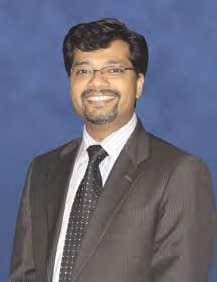| Prof S Sadagopan, Director, International Institute of Information Technology (IIIT) Bangalore, shares his insight on the unique model of industry – academia interaction at IIIT and how such an interaction can help confront some of the issues challenging higher education in our country. |
Please tell us about the vision behind setting up of IIIT Bangalore. How far has the institute succeeded in achieving this vision?”
The IIIT-B was established in 1999 with a vision to contribute to the IT world by focusing on education and research, entrepreneurship and innovation. With its unique model of education, research, and industry interaction, IIIT-B has grown to become an institution of considerable repute in academic as well as corporate circles.
Within a span of nine years, the institute has established a name for itself. This is demonstrated by the fact that IIIT-B has been conferred the status of a Deemed University by the University Grants Commission. It has been recognised as a Scientific and Industrial Research Organisation (SIRO) by the Government of India and is also the Principal Agency executing the INR 3 crore project on Telematics Demonstration as part of CAR (Core Committee on Automotive Research). The institute bagged Karnataka’s Best IT Export Award 2007 for its innovative employment programme for uplift of socio-economic weaker sections.
What are the challenges confronting India’s higher education system today? How can Information and Communication Technologies help overcome these challenges?
Our higher education system faces the problem of both quantity and quality. On one hand, we have high quality institutes like IITs, IIITs, NIT, etc, producing very large number of students and on the other hand many institutions of varying quality producing considerable number of students. Premier institutes need to increase quantity; run-of-the-mill institutes should improve quality. We need both if we are to keep our higher education system on the global map.
The role of ICT becomes important in such a scenario. Successful integration of ICTs leads to improved delivery, processes and quality control so that teachers can become more effective.
What initiatives have been taken by your institute for integrating ICT in its framework?
Connectivity in the campus is established at two levels. First, the local intranet implements a ‘virtual classroom’, where all the visual material, such as presentation slides used by professors in class, are made available electronically to students. All assignments and projects are announced and submitted online. The intranet also enables knowledge sharing among students. At the second level, 24×7 Internet access is available throughout campus, in both wired and wireless modes. IIIT-B was one of the first institutions in India to have an active wireless LAN.
All the classrooms are ‘smart’, with high-speed data networks and large projection systems for audio and video. Video conferencing capabilities are built in using state-of-the-art audio-visual equipment. They include electronic smart boards, location-sensing microphones, and multiple LCD projectors, thus enabling an enriching learning experience. All students have a Wi-Fi enabled laptop for their exclusive use and we also have a Digital Library.
| Our higher education system faces the problem of both quantity and quality. Premier institutes need to increase quantity; run-of-the-mill institutes should improve quality. We need both if we are to keep our higher education system on the global map. |
Do you think a Public-Private Partnership (PPP) model will help in effective integration of technology in higher education?
For effective integration of technology in higher education, all models – whether Private, Public or PPP – will work. What we need is the vision to execute it.
Thanks to the uniqueness of IIIT-B vis-a-vis its location at the Electronics City, involvement of Indian IT industry and the PPP model of IIIT-B, the Institute has a large set of linkages with industry in general and the IT industry in particular. The linkages come in the form of Chair Professorships like the ones by Daimler Chrysler in Automotive IT, ICICI, HP, and Canara Bank. Labs have also been funded by Industry over the years at the institute, for example, Siemens Vision Lab, Honeywell Automation Lab, Intel Planet and Community PC Lab, and HP IMS Lab. Texas Instruments has named IIIT-B as one of the elite institutes enlisted in their University Program. Companies like GE, HP, Huawei Technologies, Bank of India, Infosys, Siemens, Intel, Motorola, etc, have also endowed scholarships to support students.
What do you think of the current employability quotient among graduates? In what ways can it be enhanced?
The current employment quotient among graduates is low. As a measure to enhance it, we simply need to enhance the quality of teachers and provide them with better remuneration, to scale their level of commitment and engagement. While there is much talk about the challenge of employability, what is lacking is a structured institutional initiative.
Our institute has tied up with Radix Learning, for a professional certification programme ‘Yogyata’ aiming to enhance employability for the IT sector. Yogyata is offered as a blended-learning programme including classroom lectures, web-based, multimedia-enabled, self-learning courseware, Actionable Learning modules, synchronous and asynchronous online mentoring and collaborative learning. The curriculum is based on inputs from leading IT companies.
Do you think India’s higher education system can be compared to the best in the world, especially the UK and US? If not, what are the reasons responsible for it?
Every child knows our system is far inferior compared to the US or UK; premier Institutes happen in spite of (not because) of nurturing. Institutions must be nurtured. Universities, particularly State universities, have too much political intervention. Often caste/groups play havoc; merit is pushed to the backside. Governance of Universities must improve; educationists and not politicians must control education.
| Prof Sadagopan is a doctorate from Purdue University, USA. He taught at IIT Kanpur from 1979 to 1995 and at IIM Bangalore from 1995 to 1999. He had also taught for a term at Rutgers University, New Jersey, IIT Madras and AIT Bangkok. He is a member of Karnataka IT Vision Group, Karnataka Knowledge Commission, National Vocation Mission and also serves on the board of several PSUs. |










 Please share with our readers the idea behind setting up of Upside Learning and the journey so far.
Please share with our readers the idea behind setting up of Upside Learning and the journey so far.








